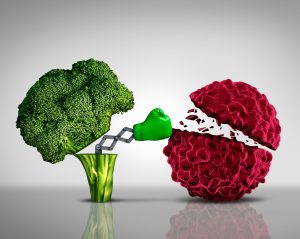Nutrition is important on any given day, however, in cancer care it is absolutely essential and can have a direct impact on the progression of the cancer and also the success of the treatments. Cancers in general have been studied for decades and in recent times, the body of evidence surrounding the impact of nutrition and exercise has increased significantly.
What do we know?
- The evidence suggests that body composition is an important prognostic factor in both early stage and metastatic cancers
- The cancer itself, as well as the treatments, can have debilitating effects on the individual and severely reduce quality of life
- It has been discovered that body composition, especially at diagnosis of breast cancer, significantly impacts the effectiveness of treatment and its success in the early stages, I – III
- Body composition has a direct impact on decreased time to tumour progression and overall mortality in some cancers and definitely breast cancer patients – therefore having muscle mass and maintaining it is significantly important.
Summary: Body composition, weight and muscle strength are significant prognostic, or predictive, factors of the progression of the condition.
Key Nutrition considerations: It is not as straight forward as – Just Eat!
Common issues that can interfere with and reduce someone’s nutrition status in cancer and cancer treatment include diarrhoea, nausea and vomiting dysphagia, xerostomia, taste changes, thick saliva, oral mucositis (tissue swelling in the mouth) and constipation. These will have direct impact on the individual’s ability to eat and the digestion and absorption of nutrients that can all adversely affect nutritional status.
Additionally, the side-effects of cancer treatments such as chemotherapy and radiation therapy can adversely affect the nutritional status of the individuals undergoing treatment. Side-effects that impact nutrition status include anorexia (loss of appetite), nausea, vomiting, diarrhoea, constipation, difficulty swallowing, alterations in taste and smell, pain, depression, and anxiety. Side-effects of radiation depend on factors such as the specific area of the body that is irradiated (e.g. head and neck) and the duration and dose of the irradiation. Early recognition of these side-effects is important, as is early intervention. It may even require preventative insertion of PEG feeds to reduce the risk of malnutrition.
Worst case scenario is the onset of cachexia, which is a “wasting” disorder that causes extreme weight loss and muscle wasting, and can include loss of body fat. This syndrome is characterized by systemic inflammation, which affects people who are in the late stages of serious diseases like cancer. ‘Normal’ means of nutrition are inadequate to prevent mortality at this stage. Additionally, there is cancer induced sarcopenia, which is a syndrome characterized by progressive and generalized loss of skeletal muscle mass and strength and it is strictly correlated with physical disability, poor quality of life and death.
So what are some of the nutrition priorities that must be appropriately addressed?
Typically, the recommendations for preventing and treating malnutrition in adults with cancer are
- Ensuring appropriate energy and protein (HPHE)
- Supporting optimal gut health – managing constipation, diarrhea, gut microbiome
Each person’s experience and initial health status are different. Additionally, their response to the treatment is different and the nutrition priorities are unique. Seeing a dietitian for support is recommended for early intervention and support, to ultimately prevent malnutrition and related weight loss, which can affect an individual’s ability to regain health and may result in delays in the treatment schedule, which can then impact the overall success of treatment.




